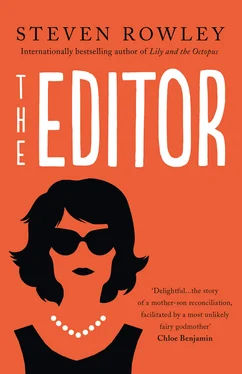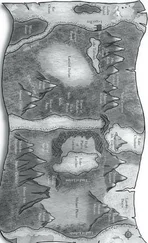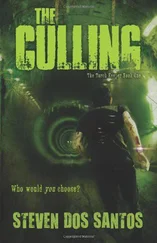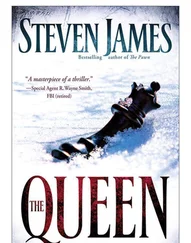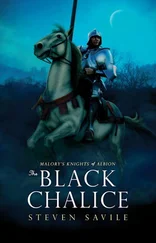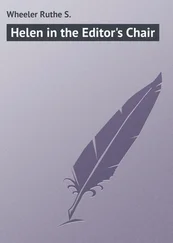A man with a beard and wide tie opens the door, startling us both. “Oh, I’m sorry, Jackie. I didn’t realize anyone was in here.”
“That’s quite all right,” she says, and the man quietly closes the door. It’s all so normal—he calls her Jackie, he sees her every day, they probably sit in staff meetings—I want to call after that man just to make sure he knows who his coworker really is.
I take advantage of the interruption. “May I ask you a question?”
“I would be happy if you did.”
“Why am I here?”
Laughter. It’s almost indescribable, the feeling of making her laugh. Like somehow all is right with the world, even if this laugh is at my expense.
“Are we speaking existentially?”
“No, no. Despite how my question sounds. I’m genuinely asking.”
“Why are you here, as opposed to another author?”
“Why my book?”
Mrs. Onassis flips back the pages that are folded over the binding of her legal pad and sets her pen down on top of it. “Well, books are a journey. And I’m always excited to embark on a journey I haven’t taken before. So I wanted to meet you, James.”
“Thank you.”
“I found your book to be very mature for a first effort. I have some ideas, if you are open to hearing them.”
“Of course.”
“Ideas that would strengthen the work and amplify the book’s central themes. It’s a wonderful setup, and there’s work to be done on the ending, but we can fix all that. In short, I would like to acquire this novel for publication. It is my sincere hope that you’re willing to work with me.”
And just like that, I’ve completed the slow climb to the top of a roller coaster. I’m about to experience the first drop and people all around me are clutching their hats and sunglasses and screaming in both fear and exhilaration and my mouth is open to scream as well, but no sound comes out. The feeling is so intense I have to look down to make sure my chair hasn’t collapsed again.
“James?”
I close my mouth in a vain attempt to appear sane. “It would be an honor to work with you.”
“Would you like to take some time to think about it?”
“Should I think about it?”
“My father always advised me to sleep a night on important decisions.”
“My father had no such counsel.”
“Well, if I may.” The way she asks permission suggests both a timidity and a deliberate command in steering our conversation. “It’s a rare editor anymore who is more … well known, shall we say, than her authors. So, immediately, there’s that to consider.” She pauses, as if to make sure I’m following. “It would also mean you saying ‘no’ to me when you believe I’m wrong. Do you think you could do that?”
“Oh, no.”
She leans back, hopefully amused. “Is that a joke?”
I have to think about it. “Perhaps. A lame attempt at one rolled in the truth. I could learn to.”
“Make a joke?”
“Say no.” It feels like a little rapport we’re building. Daniel’s heart is going to stop when I recount this bit for him later.
“I would like us to have a conventional editor/writer relationship. And that means I’ll stand up for the things I believe in strongly, and you’ll stand up for the things you believe in strongly. And we’ll debate until there’s a victor.”
For a brief second, I picture us going toe-to-toe in a boxing ring, performing the most delicate pas de deux, me too afraid to ever throw a punch. “I would like that too. For us to have a normal relationship.” No boxing gloves. “Although, it might knock my friendship with Eleanor Roosevelt down a peg.” I say the roo in Roosevelt like in kangaroo , as that’s how Dustin Hoffman says it in the movie Tootsie , and it always makes me laugh. Mrs. Onassis, however, doesn’t. Laugh. “Another joke,” I clarify.
“You must have more questions for me.”
I do. I have eleventy million questions, but synapses are firing, or misfiring—if synapses even fire (or misfire)—and all that comes out is one of those passing non sequiturs that are embarrassingly easy to access in moments of great awkwardness. “How tall was Charles de Gaulle?”
She cocks her head, like I’ve started speaking in tongues, before finally emitting a laugh. “How tall was …?” She stops to give it some thought. “Tall.”
“I don’t suppose that’s the kind of question you had in mind.”
“No, it was not.”
“I didn’t want to be obvious.”
“In that you’ve succeeded.”
“I’m sort of a Francophile. I love Paris. Which sounds dumb now that I say it—I mean, who doesn’t love Paris. But here you are and you’ve met Charles de Gaulle.”
“Well, he was very tall. He …” She starts to say more, then stops. She studies me, scanning my eyes to see if I can be trusted. She proceeds, but does so with caution. “This is neither here nor there, but I suppose I will follow your lead and be unexpected. He struck me as somewhat sad. He rode with President Kennedy and me through Paris, and when we got out of the car I remember thinking of Shelley’s Frankenstein monster. It was something about the way he moved, slowly, deliberately, and the streets were lined with villagers. I tried my best to be charming. At the time I was very focused on bringing the Mona Lisa to the United States—it had never been on loan before to a foreign nation. I wanted to be bright, sunny, for my mission. As for the monster himself, it was hard to pierce that sadness.”
I’m struck by her answer, the way she attributes Frankenstein to Shelley—in case anyone listening would miss the literary nature of the reference; I want to linger on it, but there are so many other things I want to know. About today, and every other day. About history. About the world and our place in it. About everything she’s witnessed. About why she says “President Kennedy” instead of my husband or Jack . But I can’t delve into any of that so I simply ask “Were you successful?”
“In getting the Mona Lisa ? Oh, yes. I can be quite persuasive when I want to be. Even to monsters.” This time she winks.
I understand that in being allowed to ask questions I’m being further persuaded. But I can’t stop. “How long have you worked at Doubleday?”
“Fourteen years.” She crosses her hands in her lap. “And several at Viking Press before that.”
“That’s probably more in line with what you were expecting.”
She dips her head in agreement.
“And you have an office? In this building?”
“I have an office here, down the hall. It’s a regular size and stacked high with manuscripts. I get my own coffee and wait in line to use the copier, same as anyone else.”
“And, this is embarrassing. But what do I call you?” Is there a title for former First Ladies? “Ma’am?”
“I think Mrs. Onassis would be appropriate, if you agree.”
I nod. I’ve been nodding a lot in this meeting, overwhelmed to find all the right words.
I lean in, set my arms on the table, and join my fingers. “And you want to work together.” I should feel awkward for retracing so much ground, but surprisingly I don’t.
“I see great promise. The work needs polishing, if I may be blunt, but now that I’ve met you I’m confident we will accomplish good things together.”
My cheeks grow flushed and I start to sweat and it dawns on me that we could be spending some real time together, beyond this meeting, beyond today. And if she opened up to me about Charles de Gaulle, even momentarily, she might open up to me about much, much more. That maybe she sees me as some sort of kindred spirit. That we might become … friends. My brain marches ten steps ahead of me and I do all within my power to reel it back.
Читать дальше
